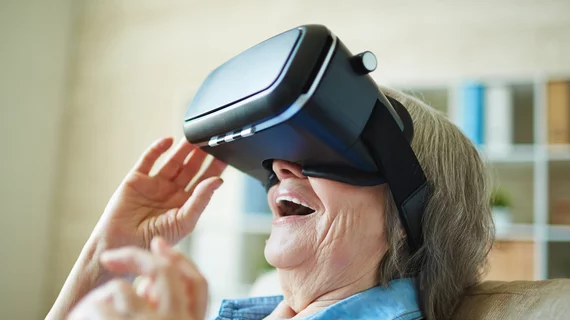Virtual reality may reduce chronic pain, preliminary study shows
Virtual reality developer AppliedVR and neuroimaging company Kernel partnered for a study to measure the impact VR has on managing chronic lower pain by comparing brain activation patterns and physiological symptoms that they say shows promise as a treatment.
The single-blind study lasted eight weeks and was controlled by a sham group, wherein AppliedVR’s RelieVRx medical device was combined with Kernel’s brain imaging headset, Flow, to customize an immersive experience aimed at producing hemodynamic changes associated with pain relief after treatment.
The companies said participants who received the genuine pain relief stimulation from the VR application achieved a slower rate of respiration and enhanced brain activation that signals a reduction in pain, whereas the sham group demonstrated no such changes. However, a joint statement from AppliedVR and Kernel noted both groups reported varying levels of pain relief.
"While we know there can be a strong placebo effect, this feasibility study showed that only the active RelieVRx treatment created changes at a physiological and brain activity level, creating a strong foundation for future research,” Josh Sackmn, president and co-founder of AppliedVR said in the statement.
AppliedVR and Kernel plan to conduct additional clinical studies to better understand specifically how RelieVRx drove these physiological changes in breathing and brain patterns, with the companies saying this is only the beginning of their ongoing research collaboration.
"This exciting research shows how our Kernel Flow technology can measure the brain and help quantify notoriously difficult to measure conditions," Ryan Field, CEO of Kernel said. "By unlocking insights into specific biomarkers related to chronic pain, we can continue to help the medical community better understand how treatments like RelieVRx can change the practice of pain medicine."
The companies said future studies will be larger in scale and expand to diverse demographics to uncover if signs of pain relief hold universal merit.

